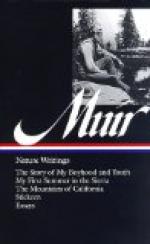“John,” he inquired, “what is that thing you are making upstairs?”
I replied in desperation that I didn’t know what to call it.
“What! You mean to say you don’t know what you are trying to do?”
“Oh, yes,” I said, “I know very well what I am doing.”
“What, then, is the thing for?”
“It’s for a lot of things,” I replied, “but getting people up early in the morning is one of the main things it is intended for; therefore it might perhaps be called an early-rising machine.”
After getting up so extravagantly early, all the last memorable winter to make a machine for getting up perhaps still earlier seemed so ridiculous that he very nearly laughed. But after controlling himself and getting command of a sufficiently solemn face and voice he said severely, “Do you not think it is very wrong to waste your time on such nonsense?”
“No,” I said meekly, “I don’t think I’m doing any wrong.”
“Well,” he replied, “I assure you I do; and if you were only half as zealous in the study of religion as you are in contriving and whittling these useless, nonsensical things, it would be infinitely better for you. I want you to be like Paul, who said that he desired to know nothing among men but Christ and Him crucified.”
To this I made no reply, gloomily believing my fine machine was to be burned, but still taking what comfort I could in realizing that anyhow I had enjoyed inventing and making it.
After a few days, finding that nothing more was to be said, and that father after all had not had the heart to destroy it, all necessity for secrecy being ended, I finished it in the half-hours that we had at noon and set it in the parlor between two chairs, hung moraine boulders that had come from the direction of Lake Superior on it for weights, and set it running. We were then hauling grain into the barn. Father at this period devoted himself entirely to the Bible and did no farm work whatever. The clock had a good loud tick, and when he heard it strike, one of my sisters told me that he left his study, went to the parlor, got down on his knees and carefully examined the machinery, which was all in plain sight, not being enclosed in a case. This he did repeatedly, and evidently seemed a little proud of my ability to invent and whittle such a thing, though careful to give no encouragement for anything more of the kind in future.
But somehow it seemed impossible to stop. Inventing and whittling faster than ever, I made another hickory clock, shaped like a scythe to symbolize the scythe of Father Time. The pendulum is a bunch of arrows symbolizing the flight of time. It hangs on a leafless mossy oak snag showing the effect of time, and on the snath is written, “All flesh is grass.” This, especially the inscription, rather pleased father, and, of course, mother and all my sisters and brothers admired it. Like the first it indicates the days of the week and month, starts fires and beds at any given hour and minute, and, though made more than fifty years ago, is still a good timekeeper.




